'I'm mostly here to listen:' Trudeau announces $2.9M in funding as First Nation investigates B.C. residential school deaths
During a visit to a First Nation in B.C. where an investigation is underway into residential school deaths, Prime Minister Justin Trudeau announced a multimillion-dollar fund to support those who survived the school, and the families of those who did not.
Trudeau was in Williams Lake Wednesday, where he announced an additional $2.9 million in funding to "continue supporting healing" for members of First Nations communities impacted by the treatment children received while attending a local residential school.
He said the money, which is in addition to $1.4 million provided by the federal government earlier this year, will help with research efforts into the deaths and disappearances of children who attended the school, including survivor interviews, and to begin the process of healing.
He said the country is committed to continued funding for the community's "search for truth, healing and closure" as it investigates what happened at the former St. Joseph's Mission Residential School, and that there would be more funding to come.
"We will be continued partners in this difficult moment, as long as it takes," he said.
"One of the most important (issues of importance) is ensuring that everything is done to make sure that all the information, all the records that exist out there be made fully available to this community, to find the truth, to give closure, to track down and honour the memory of all those lives lost in this shared history that is such a dark one."
Trudeau was welcomed to the nation in the province's central Interior, in a ceremony Wednesday morning, ahead of meetings with members of the nation, as well as survivors.
During the ceremony, he and the federal minister of Crown-Indigenous relations were presented with gifts, including a pair of drums meant to represent the heartbeat of the people.
Speaking at the ceremony, the prime minister said he was "moved" to be there, and that his presence was in part to "indicate that all of Canada grieves with this community," and acknowledged the generations of people impacted by the country's residential school system.
"I'm mostly here to listen, to learn, to hear from elders and community members what the path forward looks like not just for this community but for this country," Trudeau said.
"In partnership, in respect, in reconciliation."
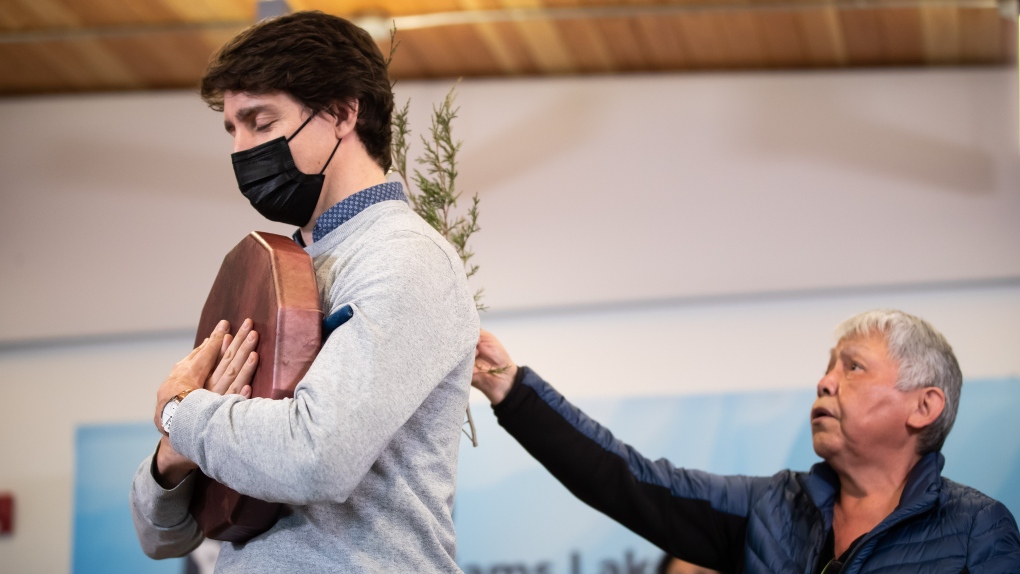 Prime Minister Justin Trudeau is touched with cedar by Charlene Belleau during a brushing ceremony while being welcomed at the Williams Lake First Nation, in Williams Lake, B.C., on Wednesday, March 30, 2022. THE CANADIAN PRESS/Darryl Dyck
Prime Minister Justin Trudeau is touched with cedar by Charlene Belleau during a brushing ceremony while being welcomed at the Williams Lake First Nation, in Williams Lake, B.C., on Wednesday, March 30, 2022. THE CANADIAN PRESS/Darryl Dyck
In turn, he gifted a painting of a raven and an eagle by a Coast Salish artist, noting the eagle's role in some Indigenous cultures as an overseer of healing and a protector.
Trudeau was at the nation to meet with residential school survivors and other members of the community. He also met with the chief of the nation and its council members and elders.
The meetings were not open to media, but those involved said they planned to share the work that is being done and still needs to be done, as well as the personal experiences of those who attended the residential school in Williams Lake.
'A LOT OF WORK TO DO'
Trudeau said the survivors he met with told him they'd spent years in silence, but are now sharing difficult stories to help the community heal.
"The courage, the strength of those elders touches us all deeply," he said.
Kukpi7 (Chief) Willie Sellars said previously that, for him, the foundation of reconciliation is truth, and that the hope for Wednesday's meetings was sharing that truth.
Following the meetings, Sellars said they'd discussed "things of significance that are going to really make a meaningful difference to how we move forward as a community, as a city, as a region and as a country."
He said he has hope, moving forward, that the things that were discussed will have a meaningful impact.
"There's still a lot of work to do. We understand that and we acknowledge that, but this is a great first step and I'm very proud."
Trudeau called the day an important moment "along the path of truth and reconciliation that we must walk as a country."
He said reconciliation is not only the work of Indigenous people and the government, but that all Canadians have a role to play.
"At the same time as those so-called residential schools were teaching Indigenous children that they had no worth and no value, every other school in this country was teaching non-Indigenous kids that Indigenous kids had no value. This is our history as a country, and until we properly grasp it and engage with it, understand it, and commit ourselves to better, we're not living up to the kind of country we all like to think we are."
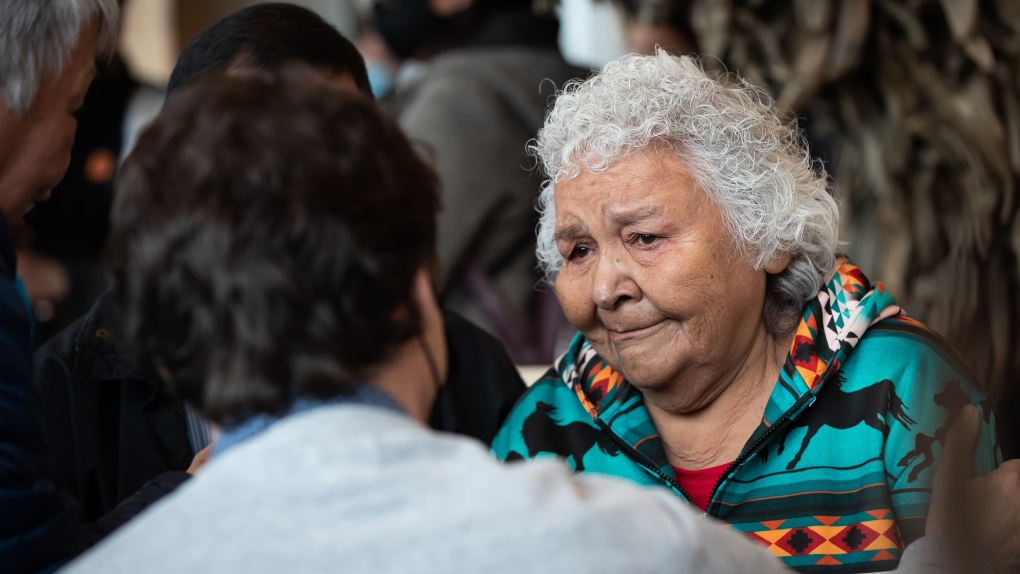 Prime Minister Justin Trudeau comforts residential school survivor Hazel Gilbert during a visit to the Williams Lake First Nation, in Williams Lake, B.C., on Wednesday, March 30, 2022. THE CANADIAN PRESS/Darryl Dyck
Prime Minister Justin Trudeau comforts residential school survivor Hazel Gilbert during a visit to the Williams Lake First Nation, in Williams Lake, B.C., on Wednesday, March 30, 2022. THE CANADIAN PRESS/Darryl Dyck
'TREATED LIKE BYSTANDERS'
Absent from the events of the day are the chiefs of the Tŝilhqot’in Nation, who said in a statement earlier this week that they would not attend or participate.
Instead, the chiefs wrote that they call on Trudeau, Crown–Indigenous Relations Minister Marc Miller and the leaders of Williams Lake First Nation to "commit to establishing a planning committee" for the investigation into potential burials at a former residential school that includes "leadership from all affected First Nations."
The chiefs said the school was attended by residents of six Tŝilhqot’in communities, and that all of its communities are impacted by the investigation into atrocities experienced at the site. They said the current investigation, which was the subject of a presentation two months ago, has not included all nations, despite requests for involvement.
"This site-investigation has already caused so much trauma in our communities. It only adds to the trauma when we are treated like bystanders to a process that affects our families and our communities so deeply. Nobody speaks for our Nation but us," said Nits'il?in (Chief) Joe Alphonse.
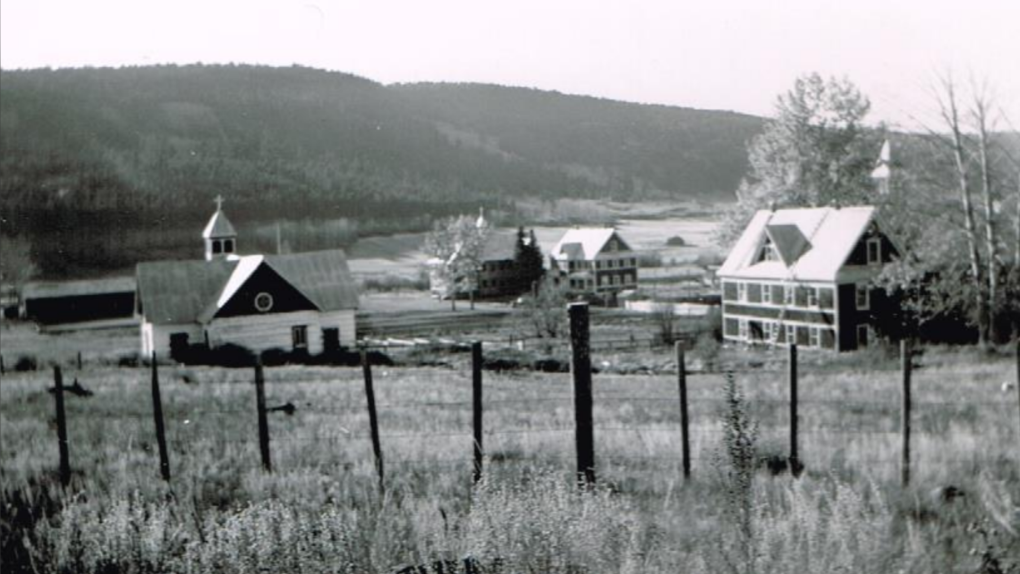 St. Joseph's Mission is seen in this undated photo submitted to and published by the SJM team.
St. Joseph's Mission is seen in this undated photo submitted to and published by the SJM team.
INITIAL FINDINGS AT THE SITE
The presentation in January revealed results of an initial investigation at the site of St. Joseph's Mission Residential School, including that ground-penetrating radar had uncovered 93 "reflections."
Those reflections may indicate the remains of dozens of people as the area examined contained 50 potential burials that are not associated with known graves.
On Tuesday, Trudeau said he was looking forward to the meeting and engaging with the community on Canada's commitment to the goals of reconciliation.
"The discovery of unmarked graves at residential school sites across this country has highlighted for all Canadians the horrors of our past for which we all bear a certain responsibility, but it's also reawaken deep, deep wounds and trauma amongst Indigenous peoples," he said from Vancouver.
"We need to show that we are there with them, to walk with them on the path of healing and reconciliation and build a better future for us all."
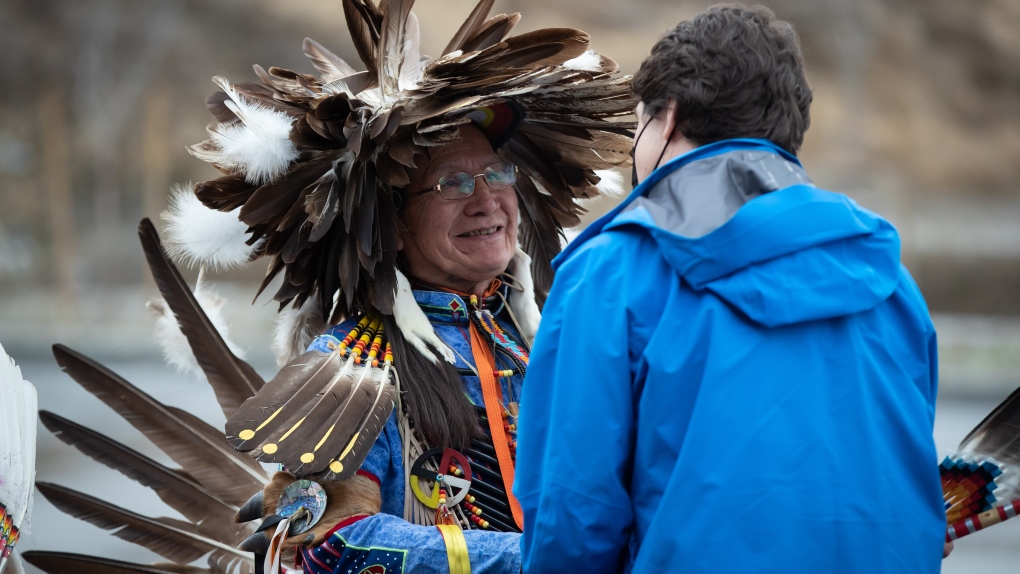 Residential school survivor and elder Frank Robbins, left, greets Prime Minister Justin Trudeau as he arrives at the Williams Lake First Nation, in Williams Lake, B.C., on Wednesday, March 30, 2022. THE CANADIAN PRESS/Darryl Dyck
Residential school survivor and elder Frank Robbins, left, greets Prime Minister Justin Trudeau as he arrives at the Williams Lake First Nation, in Williams Lake, B.C., on Wednesday, March 30, 2022. THE CANADIAN PRESS/Darryl Dyck
B.C. GOVERNMENT ACTION
The school in Williams Lake is one of several sites in Canada being examined.
Last year, a search prompted by the discovery of a child's rib bone found on the property of what was once Canada's largest residential school, uncovered what are believed to be approximately 200 unmarked graves at the Kamloops Indian Residential School. That investigation is still ongoing.
Since then, potential graves have been uncovered elsewhere, including at former residential school sites near the B.C. communities of Alert Bay and Port Alberni.
Speaking from Victoria Wednesday, Premier John Horgan outlined what he called a plan with "89 specific actions every ministry in government will take to create a better province for Indigenous Peoples in B.C."
The premier called the Declaration Act Action Plan "a first for any government in the world," and said it was developed in consultation with Indigenous people, First Nations and organizations.
The five-year plan shows how B.C. will implement the United Nations Declaration on the Rights of Indigenous People in Canada. Included is that progress reports will be submitted annually in co-operation with Indigenous peoples.
"Through the action plan, the province is committed to changing the trajectory of history through coherent, concrete and co-operative action," a 40-page document outlining the plan reads.
"The province acknowledges the widespread socio-economic and health inequities for Indigenous Peoples in B.C. and across Canada. This includes the overrepresentation of Indigenous people in the justice and child welfare systems, lower rates of education, and higher instances of poverty, unemployment and homelessness. The goals and outcomes of this action plan focus on addressing the inequities experienced by Indigenous Peoples by achieving the highest attainable standard for health and well-being."
For support for residential school survivors or others, contact the Indian Residential Schools Survivors Society at 1-800-721-0066 or www.irsss.ca.
With files from CTV News Vancouver's Regan Hasegawa and CTV National News' Melanie Nagy in Williams Lake
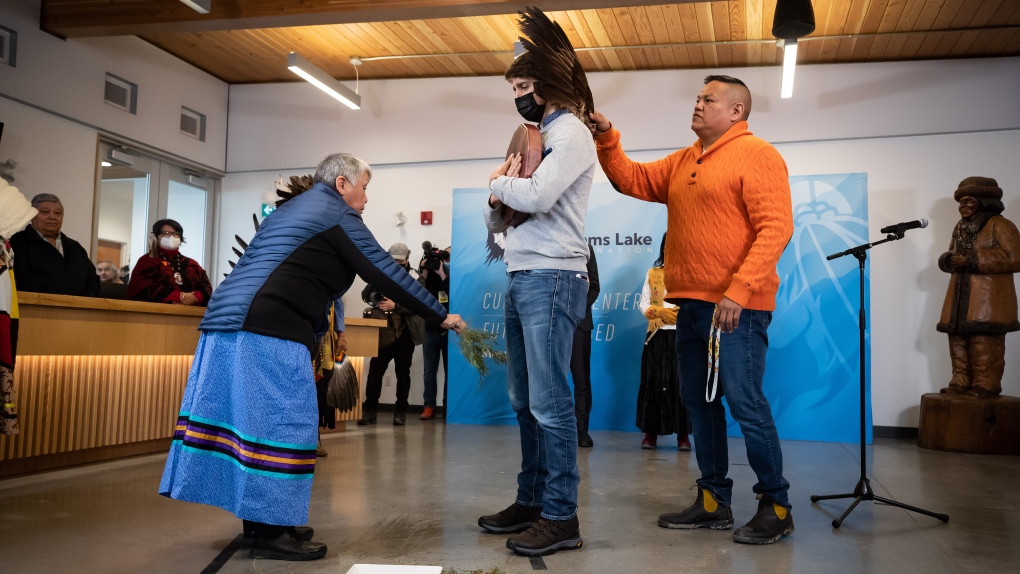 Prime Minister Justin Trudeau is touched with cedar by Charlene Belleau, left, and eagle feathers by David Archie as they perform a brushing ceremony on him during a welcoming ceremony at the Williams Lake First Nation, in Williams Lake, B.C., on Wednesday, March 30, 2022. THE CANADIAN PRESS/Darryl Dyck
Prime Minister Justin Trudeau is touched with cedar by Charlene Belleau, left, and eagle feathers by David Archie as they perform a brushing ceremony on him during a welcoming ceremony at the Williams Lake First Nation, in Williams Lake, B.C., on Wednesday, March 30, 2022. THE CANADIAN PRESS/Darryl Dyck
CTVNews.ca Top Stories

Canadian team told Trump's tariffs unavoidable right now, but solutions on the table in surprise Mar-a-Lago meeting
During a surprise dinner at Mar-a-Lago, representatives of the federal government were told U.S. tariffs from the incoming Donald Trump administration cannot be avoided in the immediate term, two government sources tell CTV News.
Pedestrian killed by Via Rail train near Kingston, Ont.
Regular rail traffic has resumed with severe delays.
Muskoka reacts to major snowfall, hundreds stuck on Highway 11
From road closures, power outages, weather declarations and nonstop shovelling, Muskoka residents were faced with nearly a metre of persistent snowfall on Saturday.
Saskatoon priest accused of sexual assault says he meant to encourage young girl with hug and kiss
A Saskatoon priest accused of sexual assault says he meant to encourage and reassure a young girl when he hugged and kissed during his testimony at Saskatoon Provincial Court Friday.
Beef prices reach record highs in Canada
The cost of beef continues to rise, reaching record highs on grocery store shelves ahead of the busiest time for many grocers and butchers before the holiday season.
Trump threatens 100% tariff on the BRIC bloc of nations if they act to undermine U.S. dollar
U.S. president-elect Donald Trump on Saturday threatened 100 per cent tariffs against a bloc of nine nations if they act to undermine the U.S. dollar.
Bob Bryar, drummer for rock band My Chemical Romance, dead at 44
Bob Bryar, former drummer for the band My Chemical Romance, has died. He was reportedly 44.
Toronto man accused of posing as surgeon, giving four women injections
A 29-year-old Toronto man has been charged after allegedly posing as a surgeon and providing cosmetic procedures on several women.
'Disappointing': Toronto speed camera cut down less than 24 hours after being reinstalled
A Toronto speed camera notorious for issuing tens of thousands of tickets to drivers has been cut down again less than 24 hours after it was reinstalled.

































